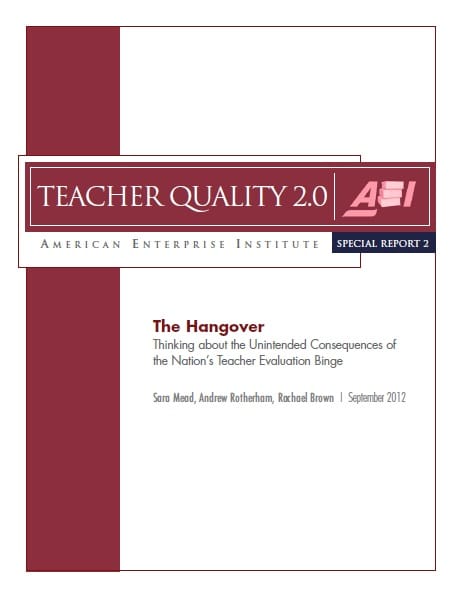 “As we start to rethink outdated tenure, evaluation, and pay systems [for teachers], we must take care to respect how uncertain our efforts are and avoid tying our hands in ways that we will regret in the decade ahead,” warns Rick Hess in the foreword of this insightful contribution to AEI’s Teacher Quality 2.0 series. Authors Sara Mead, Andrew Rotherham, and Rachael Brown of Bellwether Education Partners caution that the deluge of teacher-policy legislation over the last few years, while markedly better than the old policies, may in fact have the effect of drowning progress and innovation by mooring premature solutions and imperfect metrics in place. Moving forward, policymakers should keenly examine the fundamental tradeoffs and tensions inherent in the teacher policies they create, especially those regarding evaluation. As we strive to get teacher-evaluation policy right, we must balance flexibility and control, accept the complications created by new education models (like blended learning), and determine the right use of value-added data (human judgment must play a role in teacher evaluations). With these perspectives in mind, Bellwether’s authors offer a number of smart policy recommendations. Among them: Focus on improving, not just purging, low-quality teachers; encourage and respect innovation by creating and funding “innovation zones” for pilot evaluation systems; and accept the limits of legislation (don’t lock too much policy into legislation, as it creates a rigid system that is antagonistic to innovation). There is much to celebrate about the recent teacher-evaluation policies enacted in over twenty states. But Mead, Rotherham, and Brown are right to remind policymakers that a bit of humility is in order.
“As we start to rethink outdated tenure, evaluation, and pay systems [for teachers], we must take care to respect how uncertain our efforts are and avoid tying our hands in ways that we will regret in the decade ahead,” warns Rick Hess in the foreword of this insightful contribution to AEI’s Teacher Quality 2.0 series. Authors Sara Mead, Andrew Rotherham, and Rachael Brown of Bellwether Education Partners caution that the deluge of teacher-policy legislation over the last few years, while markedly better than the old policies, may in fact have the effect of drowning progress and innovation by mooring premature solutions and imperfect metrics in place. Moving forward, policymakers should keenly examine the fundamental tradeoffs and tensions inherent in the teacher policies they create, especially those regarding evaluation. As we strive to get teacher-evaluation policy right, we must balance flexibility and control, accept the complications created by new education models (like blended learning), and determine the right use of value-added data (human judgment must play a role in teacher evaluations). With these perspectives in mind, Bellwether’s authors offer a number of smart policy recommendations. Among them: Focus on improving, not just purging, low-quality teachers; encourage and respect innovation by creating and funding “innovation zones” for pilot evaluation systems; and accept the limits of legislation (don’t lock too much policy into legislation, as it creates a rigid system that is antagonistic to innovation). There is much to celebrate about the recent teacher-evaluation policies enacted in over twenty states. But Mead, Rotherham, and Brown are right to remind policymakers that a bit of humility is in order.
SOURCE: Sara Mead, Andrew Rotherham, and Rachael Brown, The Hangover: Thinking about the Unintended Consequences of the Nation’s Teacher Evaluation Binge (Washington, D.C.: American Enterprise Institute, September 26, 2012).
